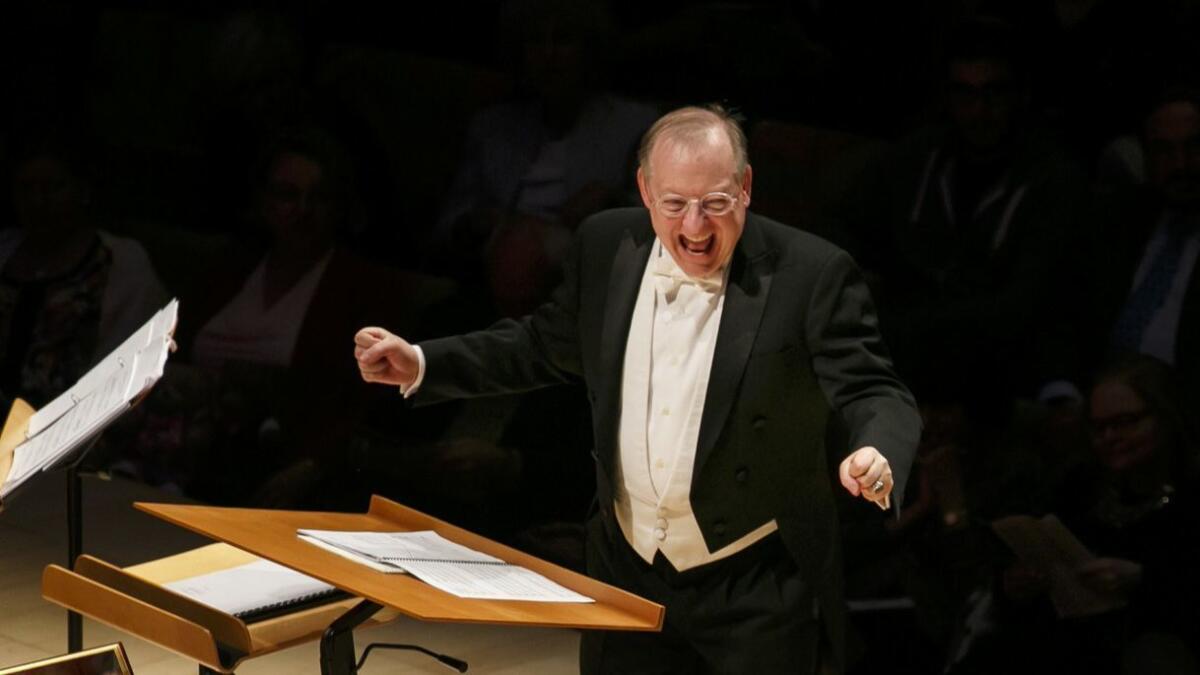Review: Handel’s ‘Saul,’ not the ‘Messiah,’ with Nicholas McGegan in his element

- Share via
The nation’s petulant leader is consumed by self-destructive envy. He appears to listen to reason from his children, but then he goes and does what he likes anyway. He has it in for a war hero. He views the enemies of his enemies as his friends, even when they are clearly Philistines. He creates chaos in the Middle East.
Before you draw any conclusions, it is the Israelite/Philistine conflict we’re talking about and the failed biblical king of Judah, as depicted in Handel’s oratorio “Saul,” which Philharmonia Baroque Orchestra & Chorale brought to Walt Disney Concert Hall on Wednesday night. This odd oratorio, an early example of a genre created by Handel when opera went out of fashion for a while in 18th century London, is not what you would expect this time of year, which is to say, it is certainly not “Messiah.”
Four years after “Saul,” Handel and the same librettist, Charles Jennens, would go on to produce that first true, most famous and still most lasting of all oratorios, meant for Easter (even if appropriated by Christmas). Instead Nicholas McGegan, the longtime music director of the Berkeley-based period instrument ensemble and as fine a “Messiah” master as there is, hatched a different and in many ways delightful, if eccentric, Easter egg.
What “Saul” is best known for, of course, is not delight but a Dead March — a model of solemnity featuring trombones, flutes and the pall-bearing beat of timpani — that has served the last rites of heads of state over centuries from George Washington to Winston Churchill. (We’ll skip its appearance on the soundtracks of such B-movies as “A Gun, a Car and a Blonde” and “Value for Money”). But it is a phoenix-rising story of love and victory over tragedy and a celebration of David.
There are no depictions of the slaying of Goliath and only sly hints of David as psalmist. Rather he is a stock but glorious hero and lover, goodness personified. Saul is a stock devious madman who turns to dark arts for help. His son Jonathan is David’s stalwart defender. Daughters — haughty Merab, first betrothed to David, and gentle Michal, David’s lover and ultimately wife — add love interest. Despite a tendency for pomposity — Jennens, a wealthy amateur poet who was mocked as “Suleyman the Magnificent” — “Saul” has an effective dramatic arc.
Mainly, though, it has Handel’s gift for magnificence in a score full of grand effects. The orchestra is, for its time, plentiful, with sizable brass and wind sections. There are great Handel choruses that pave the way for “Messiah” and strong roles, particularly for the male voices.
MORE MUSIC: Patricia Kopatchinskaja and Cameron Carpenter revitalize classical »
In all this McGegan, who during the last 33 years has made Philharmonia Baroque the most robust of American early music ensembles and who takes infectious pleasure in Handel, was in his element. He assembled a first-rate cast and fine chorus. His period orchestra is stuffed with early music stars, including concertmaster Elizabeth Blumenstock, flutist Janet See, theorbo player David Tayler and harpsichordist (here playing organ) Jory Vinikour.
All the instruments are either from Handel’s time or copies, with the exception of the glockenspiel, which appears to be an off-the-rack Yamaha. The period bass trombone is really something with a slide so long the player needs a stick to extend it and must take care not to hit others in the orchestra.
Along with pleasure, McGegan went in for grandeur and, despite a fairly clunky set-up and singers reading from scores, streamlined drama (under three hours, which is short of “Saul”). A spectacularly vital David, the countertenor Aryeh Nussbaum Cohen, gave rising-star notice (he’s slated for San Francisco Opera’s new production of Handel’s “Orlando” in June). Sherezade Panthaki’s flirtatious Michal (her facial expressions were the evening’s best theater) contrasted with Yulia Van Doren’s fiery Merab. Daniel Okulitch, who might be remembered as the best thing about Los Angeles Opera’s “The Fly” some years ago, took Saul’s torment to a new, gripping level.
But this was above else a McGegan operation in which the conductor basically found a way to make everything, be it happy or sad, seductive. He may be a familiar L.A. mainstay as a Hollywood Bowl regular and principal guest conductor of the Pasadena Symphony, but some things never get old, such as during an unaccompanied passage of a duet between Michal and Merab, when McGegan turned and looked at the two sopranos is state of ecstatic transport.
Choruses soared. “Saul” soared.
McGegan is the Philharmonia Baroque, and it will be hard to imagine the orchestra without him when he steps down after next season.
SPRING ARTS PREVIEW: Critics’ recommendations and emerging artists to know »
More to Read
The biggest entertainment stories
Get our big stories about Hollywood, film, television, music, arts, culture and more right in your inbox as soon as they publish.
You may occasionally receive promotional content from the Los Angeles Times.











